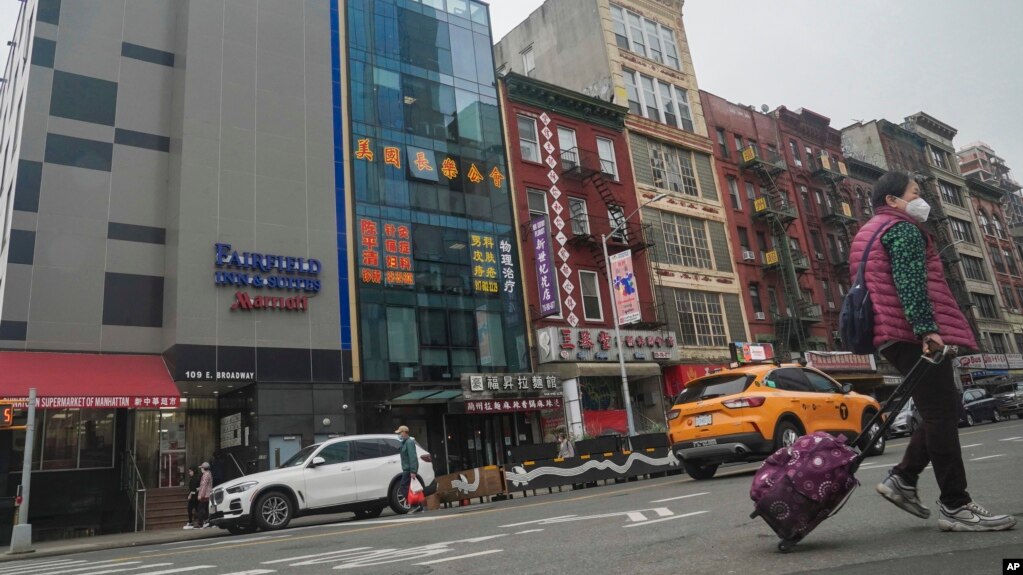有罪とされた場合、両容疑者は最長25年の禁錮刑となるようです。
このような非公式警察署店は日本国内にも何箇所か存在するようで、東京都秋葉原、銀座、名古屋、大阪、福岡と推察されています。(2023年4月18日BBC news/配信Yagoo news)
中国側からすれば華僑や今回のよう回国籍をもった中国人を全て監視するには必要は出先機関なのでしょうが、怖い話です。
VOAで英語を学びましょう!!
中国が主張する海外秘密警察署とは?(和訳)
What Are China’s Alleged Secret Overseas Police Stations?
2023April,22
ニューヨークの警察は、中国の警察機関の秘密警察署を設置したと申し立てれている2人の男を逮捕しました。目的は、報道によれば与党共産党の反対派の情報を収集することだったとされています。
このようなオフィスは、北米やヨーロッパなど各国で、中国に家族やビジネス上の接点を持つ共産党批判者の間で報告されています。
中国は、これらの事務所が警察署であることを否定しています。運転免許証の発行など、主に市民サービスを提供するために存在すると言います。
シー・ジンピン習近平は共産党の指導者であり、中国の国家元首です。彼の腐敗撲滅キャンペーンは、中国国内および海外における彼の指導に対する批判を標的としています。
ニューヨークでの月曜日の逮捕は、中国の国家警察の34人の警官に対する告発と同時に行われました。彼らはソーシャルメディアを利用して、米国内の政党批判者を標的にした罪に問われていると、告訴当局が月曜日に発表しました。
ここでは、中国が海外の秘密警察署を運営しているとの告発について見ていきます。
ニューヨークの事件の最新情報は?
司法省は月曜日の声明で、逮捕された2人の男性は中国政府高官の指示と統制の下で行動していたと発表しました。
男性は”ハリー”ルー・ジアンワン(61)とチェン・ジンピン(59)で、ともにニューヨーク出身の米国人であることが判明しました。今回の逮捕は、この種のものとしては世界で初めてのことです。
米司法当局は、2人は外国政府のエージェントとして司法省に登録していなかったと言っています。
米国当局によると、この事務所は、中国人の中国の運転免許証の更新を手伝うなど、いくつかのサービスを行っていたと言います。しかし、中国政府がカリフォルニアに住むChinese descent中国系の民主化運動家を見つける手助けをしたしたとのことです。また、同事務所は、中国に戻りたくないfugitive逃亡犯を監視し脅したと当局は言っています。
オフィスの目的は何なのか?
ワン・ウェンビン氏は中国外務省の報道官です。彼は、"海外の警察署などというものは存在しない "と述べています。彼は、米国を "政治的manipulation操作 "と非難しました。中国の外務省は、運転免許証の更新などで市民を助けるためにセンターを運営していると言っています。
セーフガード・ディフェンダーズは、スペインに本拠を置くNGO団体です。同団体は昨年発表した報告書で、中国警察がこうしたセンターを使って海外の批評家をスパイし、市民と非市民の双方に迷惑をかけたり脅したりしていると非難しています。
米国の法執行機関は、ニューヨークの放送局は中国公安部の福州事務所によって運営されていると述べます。彼らは、ニューヨークで活動する権限はなく、米国の法律と国家主権に違反していると書いています。
今回の調査は米中関係にどのような影響を与えるのでしょうか?
中米政治関係は歴史的な低水準にあります。2月には、米国上空で発見された中国のスパイ気球を理由に、米国はアントニー・ブリンケン国務長官の訪問を中止しました。
中国の違法な警察署を告発したことで、ファーウェイ、TikTokなどの中国企業に対する悪感情はさらに高まるでしょう。
中国が米国で逮捕された2人の釈放を求めるかどうかは不明で、2人とも米国籍です。中国は過去に、いわゆる人質外交で非難されたことがあります。以前、中国の電子機器大手ファーウェイの幹部逮捕をめぐって、カナダ人2人を収監したことがあります。
中国はどこで同様の事務所を運営しているのでしょうか?
2002年2月のニュースリリースで、フュゥーヂャーン福建省政府は、5大陸に最初の30カ所の” フゥーヂョォゥ福州警察海外サービスステーション”を設置したと発表しました。
セーフガード・ディフェンダーズは、このような事務所が現在、カナダからニュージーランドまで、世界中に100以上あると推定しています。大使館内に設置されたものもあれば、中国系住民に人気のあるビジネスセンターで運営されているものもあります。
What Are China’s Alleged Secret Overseas Police Stations?
Police in New York have arrested two men for allegedly setting up a secret police station for a Chinese police agency. The goal was reportedly to collect information on opponents of the ruling Communist Party.
Such offices have been reported across North America, Europe and in other countries with critics of the Communist Party who have family or business contacts in China.
China denies that they are police stations. It says they exist mainly to provide citizen services such as providing driver's licenses.
Xi Jinping is the Communist Party leader and China’s head of state. His campaign against corruption has targeted criticism of his leadership both in China and overseas.
The arrests Monday in New York came alongside charges against 34 officers with China’s national police force in China. They are accused of using social media to target party critics in the United States, officials said Monday.
Here is a look at the accusations that China is running secret overseas police stations.
What is the latest in the New York case?
The two men who were arrested were acting under the direction and control of a Chinese government official, the Justice Department said in a statement Monday.
The men were identified as “Harry” Lu Jianwang, 61, and Chen Jinping, 59, both U.S. citizens from New York City. The arrests are the first of their kind anywhere in the world.
The two did not register with the Justice Department as agents of a foreign government, U.S. law enforcement officials said.
U.S. officials said the office did perform some services like helping Chinese citizens renew their Chinese driver’s licenses. But they said it also helped the Chinese government find a pro-democracy activist of Chinese descent living in California. The office also threatened a fugitive who police who wanted to return to China, officials said.
What is the purpose of the offices?
Wang Wenbin is China’s foreign ministry spokesperson. He said there was “no such thing as an overseas police station.” He accused the U.S. of “political manipulation.” The foreign ministry said it operates the centers to help citizens with things like renewing drivers’ licenses.
Safeguard Defenders is a Spain-based nongovernment group. In a report published last year, the group accused Chinese police of using such centers to spy on critics overseas and to bother or threaten both citizens and non-citizens.
U.S. law enforcement officials said the station in New York was operated by the Fuzhou office of China’s Ministry of Public Security. They wrote that it had no power to operate in New York and that it violated U.S. law and national sovereignty.
How will the investigation affect U.S.-China relations?
China-U.S. political relations are at a historic low. In February, the U.S. canceled a visit by Secretary of State Antony Blinken because of a Chinese spy balloon that was discovered over the United States.
The accusations of illegal Chinese police stations will likely bring more bad feelings towards China and Chinese businesses, such as Huawei and TikTok.
It is not clear if China will seek the release of the two men arrested in the U.S. Both men are U.S. citizens. China has in the past been accused of so-called hostage diplomacy. It previously imprisoned two Canadian citizens over the arrest of a top executive of Chinese electronics giant Huawei.
Where does China operate similar offices?
In a February 2002 news release, the government of Fujian province said it had created the first 30 “Fuzhou Police Overseas Service Stations” on five continents.
Safeguard Defenders estimates that there are now more than 100 such offices around the world, from Canada to New Zealand. Some are based in embassies, while others have operated out of business centers that are popular among people of Chinese descent.
Words in This Story
alleged — adj. accused of having done something wrong or illegal but not yet proven guilty
renew — v. to cause to continue to be effective or valid for an additional period of time
descent — n. the people in your family who lived before you were born
fugitive — n. a person who is running away to avoid being captured
manipulate — v. to deal with or control (someone or something) in a clever and usually unfair or selfish way
